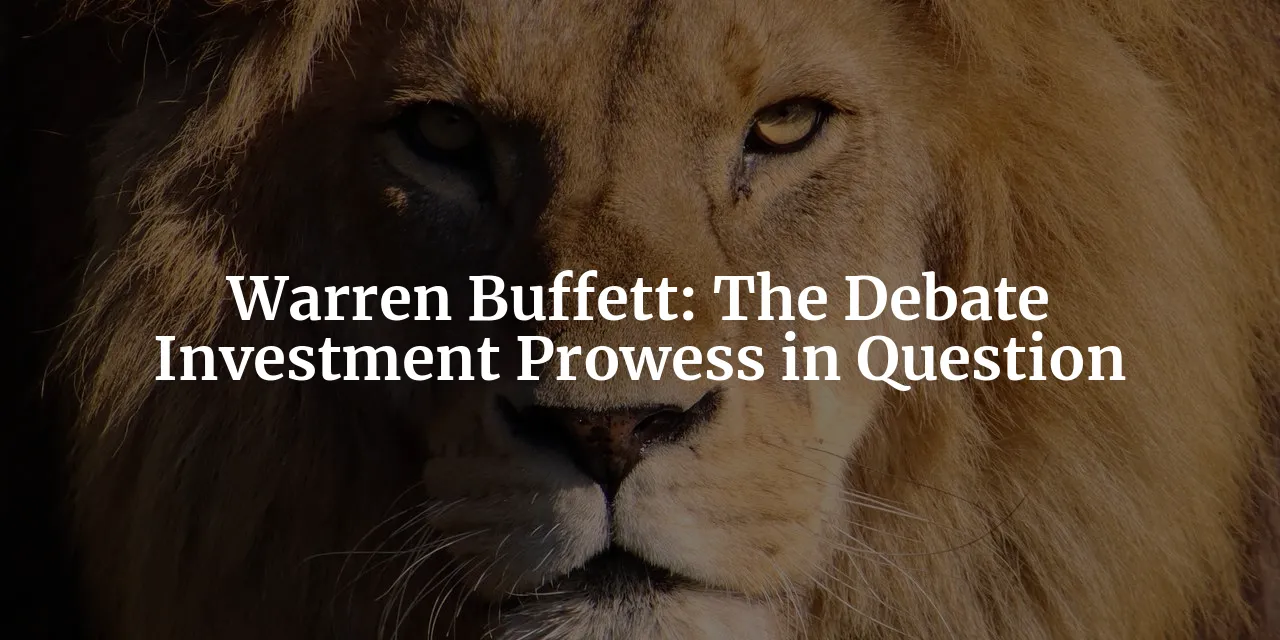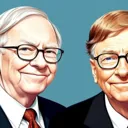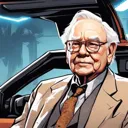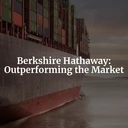Tags: Warren Buffett / History / Comments
This fanpage is not officially affiliated with Berkshire Hathaway: Disclaimer
Attention Berkshire Hathaway shareholders! Dive into the captivating debate about Warren Buffett's investment prowess. Explore the recent doubts, historical success, and the case for optimism, all while considering the skeptic's view. Discover whether Buffett's touch remains as potent as ever in the ever-evolving investment world.

Introduction
In the grand theater of investment, where fortunes rise and fall with the ebb and flow of markets, few names command as much respect—and scrutiny—as Warren Buffett. The Oracle of Omaha, as he is affectionately known, has long been the embodiment of investment acumen, guiding Berkshire Hathaway to towering heights with a blend of patience, insight, and an unerring knack for value. Yet, even legends are not immune to the cyclical nature of success. As markets evolve and new challengers emerge, the strategies that once defined success are often questioned, leaving investors to ponder an eternal question: Has Warren Buffett lost his touch?
Buffett's investment decisions, closely watched by millions, have become a barometer for the health of value investing itself. In recent years, however, the winds of doubt have begun to swirl with greater intensity. The performance of Berkshire Hathaway, when juxtaposed against the roaring success of the S&P 500, has ignited a debate not just about Buffett's recent choices, but about the very principles that underpin his philosophy. From investments in underperforming stocks to decisions that seem out of step with a rapidly changing market landscape, the scrutiny has been intense.
Yet, to understand the present, one must first appreciate the past. Buffett's journey is one of historic success, marked by an unparalleled record of turning middling companies into gold mines and identifying undervalued stocks that would later soar. His approach, characterized by long-term investment in fundamentally strong companies, has become gospel for many. But as Berkshire Hathaway faces a period of underperformance, the question arises: Is this merely another cycle of doubt, or has the sage of Omaha finally encountered a challenge he cannot overcome? Let's find out!
The Recent Doubts
Since 2015, Berkshire Hathaway has found itself in an unfamiliar position—lagging behind the S&P 500 index. This underperformance has not gone unnoticed, raising eyebrows and questions alike about Buffett's current strategy. According to 3, Berkshire Hathaway's stock would be worth approximately 15% less without its pivotal investment in Apple, a move that, while successful, underscores the conglomerate's struggle to keep pace with the broader market. The S&P 500 has outperformed Berkshire with a total return gain of +164% compared to Berkshire's +155%, highlighting a rare period of underachievement for Buffett's empire.
Specific investments have come under particular scrutiny. For instance, Buffett's decision to increase stakes in companies like Sirius XM Holdings and Liberty SiriusXM, despite their lackluster performance, has puzzled many. Sirius XM Holdings, the largest of these bets, is down 12.2% this year, a stark contrast to the S&P 500's gain of 24.3% 1. Similarly, Buffett's continued investment in Chevron and Occidental Petroleum, despite their underwhelming short-term performance, has raised questions about the efficacy of his value-based approach in a market seemingly driven by technology and rapid growth 1 & 2.
Criticism has not been limited to Buffett's choice of investments. David Rolfe, a long-time investor in Berkshire Hathaway, sold off his firm's roughly $100 million stake in frustration over Buffett's recent decisions and the perceived inability to deploy Berkshire's vast cash reserves productively 6. This sentiment reflects a broader concern among investors about whether the size of Berkshire Hathaway has become a hindrance, making it increasingly difficult to find undervalued companies that can significantly impact the conglomerate's bottom line 2.
Yet, for all the recent doubts, it's essential to place Berkshire Hathaway's performance in context. The conglomerate's stock has reached a fresh all-time high in 2024, suggesting that, despite the underperformance relative to the S&P 500 since 2015, the company remains a formidable force in the investment world. Furthermore, Buffett's track record since the 1960s, with average annual returns around 20%, speaks to a legacy of success that few can match. The question of whether Warren Buffett has lost his touch is not new; it has arisen periodically throughout his career, only for Buffett and Berkshire Hathaway to emerge stronger.
As we delve deeper into the analysis, it's crucial to remember that investment is as much about cycles and sentiment as it is about numbers. The recent doubts surrounding Buffett and Berkshire Hathaway reflect the natural ebb and flow of market dynamics and investor expectations. Whether this period will be remembered as a brief dip in an otherwise stellar journey or a turning point in the storied career of Warren Buffett remains to be seen.
Historical Success
Warren Buffett, the Oracle of Omaha, has long been celebrated for his unparalleled success in the investment world. Since taking the helm of Berkshire Hathaway in the mid-1960s, Buffett has transformed a struggling textile manufacturer into a behemoth conglomerate with a market capitalization soaring above $863 billion. Under his stewardship, Berkshire Hathaway's book value per A share grew from $19 to just over $77,500 in 2009, marking an annualized increase of 20.7% since 1965 4. This staggering growth starkly contrasts with the S&P 500's annualized return of 9.6% over the same period, highlighting Buffett's exceptional ability to outperform the market. Note that as of Q3 2023 the book value per A share is approximately $363,000 ↗, which is expected to have increased significantly in Q4 2023.
Buffett's knack for steering clear of risky derivatives and excessive leverage has been a cornerstone of his success 4. His investment philosophy, characterized by prudence and patience, has allowed Berkshire Hathaway to navigate through tumultuous markets unscathed, often emerging stronger. The transformative impact of Berkshire Hathaway's investment in Apple starting in 2016 is a testament to this 3. Despite the recent underperformance relative to the S&P 500, the purchase of Apple shares has significantly boosted Berkshire's stock, contributing to a total return gain of +155% since 2016, compared to Apple's +638% 3.
Moreover, Buffett's advice on investing, particularly his recommendation to invest 90% of his wife's inheritance in an S&P 500 index fund, underscores his belief in the power of the market and the cyclic nature of investment performance 2. His philosophy emphasizes patience, long-term investing, and avoiding irrational bets, principles that have guided Berkshire Hathaway to its monumental success 5.
The Buffett Approach
At the core of Warren Buffett's investment strategy lies a steadfast commitment to value investing and long-term growth. Buffett's approach is deeply rooted in assessing company fundamentals and intrinsic value, steering clear of speculative trading, and fostering a profound understanding of the businesses he invests in. This philosophy has not only shaped Berkshire Hathaway's investment portfolio but has also influenced generations of investors worldwide.
Buffett's aversion to speculative trading is matched by his emphasis on the importance of Berkshire Hathaway's cash reserves. These reserves, which hit a record amount of more than $157 billion at the end of September 2023, are a testament to the strategic patience that underpins Buffett's approach 7. This financial prudence affords Berkshire the flexibility to make opportunistic investments, capitalizing on market fluctuations to secure assets at favorable prices.
The role of Berkshire Hathaway's co-managers, Todd Combs and Ted Weschler, further exemplifies the Buffett approach. Hired in 2010 and 2011, respectively, they contribute to Berkshire's investment decisions, embodying Buffett's principles of value investing and strategic patience 2. Their involvement underscores the collective wisdom that guides Berkshire Hathaway, ensuring that the company remains faithful to its foundational investment philosophy.
Buffett's own words on market fluctuations and investor behavior illuminate the essence of his approach. He advises investors to be fearful when others are greedy and greedy only when others are fearful, a principle that has steered Berkshire through decades of market vicissitudes. This philosophy, coupled with a focus on long-term value creation, distinguishes Buffett's approach from the fast-paced trading that characterizes modern markets.
The historical success of Berkshire Hathaway under Warren Buffett's leadership and the enduring relevance of the Buffett approach stand as compelling testaments to his investment genius ↗. Despite periodic doubts about his ability to keep pace with the S&P 500, the record since the 1960s—with average annual returns around 20%—speaks for itself ↗. Moreover, Berkshire Hathaway's recent all-time high in 2024 and its approach to reaching a $1 trillion market value affirm that Warren Buffett's touch remains as potent as ever.
The Case for Optimism
In the world of investing, few names resonate as profoundly as Warren Buffett's. The Oracle of Omaha, as he is affectionately known, has navigated Berkshire Hathaway to unprecedented heights, and recent developments suggest that reports of his diminished prowess may be greatly exaggerated. A closer examination reveals several compelling reasons for optimism.
First and foremost, Berkshire Hathaway's Class A shares have recently achieved a record high, reaching an astonishing above $600,000 7, while Class B shares have topped $400 as well due to their value ratio of 1,500 ↗. This milestone is not merely a number but a testament to the enduring value and robust health of the conglomerate under Buffett's stewardship. Furthermore, this achievement sets the stage for an even more remarkable milestone: the potential for Berkshire Hathaway to reach a $1 trillion market value 7 ↗. Such a feat would not only cement Berkshire's place in financial history but also underscore the effectiveness of Buffett's investment philosophy in the modern era.
The company's performance in 2024 further bolsters the case for optimism. With a gain of more than 10%, Berkshire Hathaway has doubled the S&P 500's return 7. This outperformance is particularly noteworthy in a market environment that many have claimed is increasingly difficult for traditional value investing strategies to navigate successfully.
Moreover, Berkshire's significant cash reserves, exceeding $157 billion, provide a strategic advantage 7. This financial firepower allows Buffett and his team the flexibility to seize investment opportunities as they arise, without the constraints that burden less well-capitalized entities. It is a reminder of Buffett's adage about being "fearful when others are greedy, and greedy when others are fearful."
The strategic increase in stakes in Chevron and Occidental Petroleum, by 18% and almost 9% respectively ↗, alongside the growth in the stake of SiriusXM, demonstrates not only a belief in the long-term value of these companies but also an adherence to a diversification strategy that has served Berkshire well over the decades 2. These moves reflect a nuanced understanding of the energy sector's dynamics and the media landscape, areas where Buffett sees enduring value.
In sum, the case for optimism is grounded in a combination of recent performance, strategic positioning, and the timeless principles of value investing. Buffett's approach, characterized by patience, discipline, and a keen eye for value, remains as relevant as ever. The record high of Berkshire Hathaway's shares, the potential for reaching a $1 trillion market value, and the strategic investment moves all point to a bright future for the conglomerate and its shareholders.
The Skeptic's View
Despite the compelling case for optimism, it is essential to consider the skeptic's perspective. Critics point to several valid concerns, chief among them being Berkshire Hathaway's underperformance relative to the S&P 500 index since 2015 3. This period of lagging returns has led some to question whether the investment landscape has evolved in ways that challenge Buffett's traditional value investing approach.
One of the critical challenges facing Berkshire Hathaway is the sheer size of its portfolio ↗. As the conglomerate has grown, finding undervalued companies that can significantly impact its overall performance has become increasingly difficult 2. This scale dilemma is not unique to Berkshire but is a challenge faced by all large investment entities attempting to move the needle on returns.
Moreover, the investment landscape has indeed evolved, with technology and global markets introducing new dynamics that demand adaptation. The rise of technology giants and the rapid pace of innovation have led some to argue that value investing, with its focus on undervalued assets, may struggle to capture the growth potential of these new market leaders.
The role of Kraft Heinz ↗ and other struggling investments also looms large in the skeptic's view 6. These investments have not only underperformed but have also shaped perceptions of Buffett's recent performance. The $3 billion write-down on Berkshire's Kraft Heinz investment is a case in point, highlighting the risks inherent in even the most carefully considered investment decisions.
Finally, the high expectations set by Buffett's historical performance add to the scrutiny. With annualized returns around 20% since the 1960s, the bar is set exceptionally high. Any period of underperformance, therefore, invites intense analysis and critique.
While the skeptic's view raises important considerations, it is also essential to contextualize these challenges within the broader arc of Buffett's career and Berkshire Hathaway's trajectory. The investment world is inherently cyclical, and periods of underperformance are not uncommon for even the most skilled investors. The debate around value investing in a market dominated by technology and growth stocks is ongoing, but if history is any guide, counting Warren Buffett out may be premature.

Conclusion
In the world of investing, few names command as much respect and scrutiny as Warren Buffett. The recent doubts surrounding his investment decisions and Berkshire Hathaway's underperformance relative to the S&P 500 have ignited a debate about whether the Oracle of Omaha has lost his touch. However, it is essential to place these recent developments in the context of Buffett's historic success and enduring investment philosophy.
Despite the recent underperformance, Berkshire Hathaway's stock has reached a record high in 2024, signaling the enduring value and robust health of the conglomerate under Buffett's stewardship. The potential for Berkshire Hathaway to reach a $1 trillion market value further underscores the effectiveness of Buffett's investment philosophy in the modern era. The company's outperformance in 2024, its significant cash reserves, and strategic investment moves all point to a bright future for the conglomerate and its shareholders.
While the skeptic's view raises valid concerns about the challenges facing Berkshire Hathaway, it is crucial to contextualize these within the broader arc of Buffett's career and the company's trajectory. The investment world is inherently cyclical, and periods of underperformance are not uncommon for even the most skilled investors. The debate around value investing in a market dominated by technology and growth stocks is ongoing, but history suggests that counting Warren Buffett out may be premature.
The recent doubts about Warren Buffett's investment acumen are part of a perennial cycle of skepticism that has accompanied his career. The enduring relevance of his investment philosophy, characterized by patience, discipline, and a keen eye for value, remains as potent as ever. As the investment landscape continues to evolve, the recent record high of Berkshire Hathaway's shares and the potential for future growth affirm that Warren Buffett's touch remains steadfast. Whether the recent doubts are just another cycle of skepticism or a fundamental shift in the investment landscape remains to be seen, but the case for optimism is grounded in Berkshire Hathaway's recent performance, strategic positioning, and timeless principles of value investing.
References
-
Warren Buffett Throws Good Money After Bad At 5 Stocks - www.investors.com ↩↩
-
The S&P 500 is on such a tear that even Warren Buffett can't keep up - qz.com ↩↩↩↩↩↩
-
Berkshire Hathaway's Underperformance Since 2015 Is Getting Harder To Ignore - seekingalpha.com ↩↩↩↩
-
Morningstar: Warren Buffett Hasn't Lost His Touch, He's CEO of the Year [January 2009] - www.cnbc.com ↩↩
-
Has Warren Buffett Lost His Magical Touch? [2012 Article] - www.forbes.com ↩
-
Has Warren Buffett lost his touch? Berkshire’s trailing S&P 500 — and Kraft Heinz is part of the problem. [2019 article] - www.chicagotribune.com ↩↩
-
Berkshire Hathaway topped $600,000 a share last week, aiming at $1 trillion market value - www.cnbc.com ↩↩↩↩↩











